|
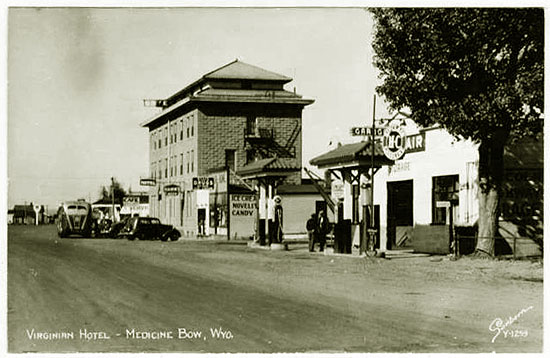
Medicine Bow looking west on the Lincoln Highway, approx. 1937.
A short distance west of the Medicine Bow River, the motorist came to Medicine Bow, a town, which because of
movies and a novel by Owen Wister has a fame disporportionate to its size and bearing little resemblance to the
Wild West view in one's imagination from reading the novel or watching the movies. Certainly, however, at one
time it matched Wister's description. The hotel in the photo is the Virginian named after the central character in Wisher's novel.
The Hotel was built by August Grimm (1868-1934), first mayor of Medicine Bow, and his
partner George Plummer and opened on September 30, 1911. Previously Gus Grimm had operated one of the
town's saloon. Harriet White Fisher related in her A Woman's World Tour in a Motor that inqiry was
made of Grimm on directions to Cheyenne. " We afterward found the name ' Gus Grimm' on many sheep trails
roads giving directions, but the hand always pointed toward Gus Grimm's place of business, telling the traveller
where he could get fine whiskey." The hotel featured
the first electric lights and sewer system in the town.
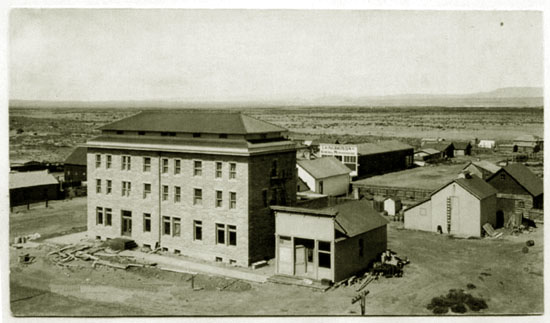
The Virginian Hotel nearing completion, 1911.
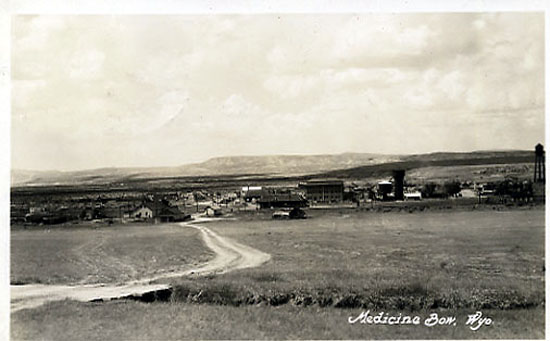
Medicine Bow looking north from the Medicine Bow-Elk Mounain Rd. toward the Lincoln Highway, 1920's.
In the center are the railway depot and the Virginian Hotel. To the left of where the road crosses the
railroad is the Mercantile.
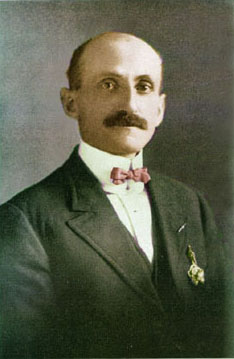 . . . .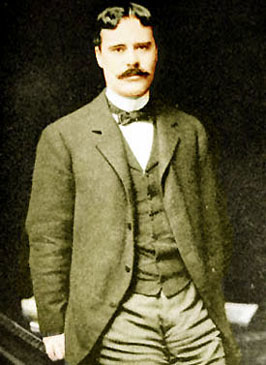
Left,August Grimm
Right, Owen Wister
The badge worn by Grimm hanging from his breast pocket appears to be an Elks Badge complete with an elk tooth. Grimm was a member of the
Benevolent and Protective Order of Elks. The Grimm and Wister are responsible for the fame of Medicine Bow and putting it on the map. In the Virginian, Wister made
Medicine Bow into the quintesential town of the Wild West, complete with cowboys, saloons, shootouts in the main street, and
school marms. But were it not for Gus Grimm, the town's first mayor, legislator, and builder of the Virginian
Hotel, the lincoln highway would have passed it by and the town would have faded like Bosler further to the east.
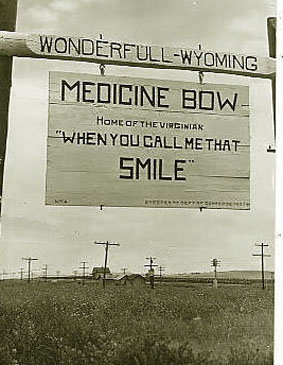 Welcoming Sign to Medicine Bow. Note the spelling of
"wonderfull." Welcoming Sign to Medicine Bow. Note the spelling of
"wonderfull."
As indicated in the photo to the left, Medicine Bow takes great pride
in being the fictional home of the Virginian in Owen Wister's classic novel of Wyoming. The line quoted on the sign
comes after Trampas, the villain, in a poker game casually called the Virginian a "son-of-a-bitch":
The Virginian's pistol came out, and his hand lay on the
table, holding it unaimed. And with a voice as gentle
as ever, the voice that sounded almost like a caress, but
drawling a very little more than usual, so that there was
almost a space between each word, he issued his orders to
the man Trampas:-
"When you call me that, smile!" And he
looked at Trampas across the table.
Yes, the voice was gentle. But in my ears it seemed as if
somewhere the bell of death was ringing.
Wister's novel is generally regarded as the model for all subsequent Western novels.
The novel has been made into two silent films as well as three "talkies, the most
recent a made-for-TV version. In the 1929 movie, starring Gary Cooper as the Virginian, Walter Huston as Trampas, and
Mary Brian as Molly Wood, the line was revised:
Trampas: "You long-legged-sonova -".
The Virginian: "If you wanna call
me that, smile."
Trampas: "With a gun in my belly, I always smile."
After the arrival of the railroad, Medicine Bow's primary
population was military. The 1870 census listed the population as 100, consisting of
65 military and 35 civilians, perhaps for good reason. On June 25, 1870, the
town was attacked by Indians, but fought off by Company 1 of the 2nd cavalry.
Ten years later, the total population was shown in the 1880 census as but 54, primarily
associated with the railroad. Even the cemetery is primarily associated with the
railroad, either workers or in some instances passengers. Medicine Bow, itself, was referred to by
C. E. Van Loane, writing in Outing Magazine, July 1910, as a "small town with a big league graveyard." The most famous
resident of the cemetary, lying in an unmarked grave, is William W. Piper, the
designer of the University of Oregon's Administration Building, Deady Hall. The
building, the last ever designed by Piper, is a baroque, Second Empire style, mansarded brick pile
with multiple dormers, almost as ugly as the old New York State Capital Building. Piper
ended his life shortly after the completion of Deady Hall by taking a dive, head first,
off a Union Pacific train passing through Medicine Bow. Piper also designed Portland's
New Market Theatre.
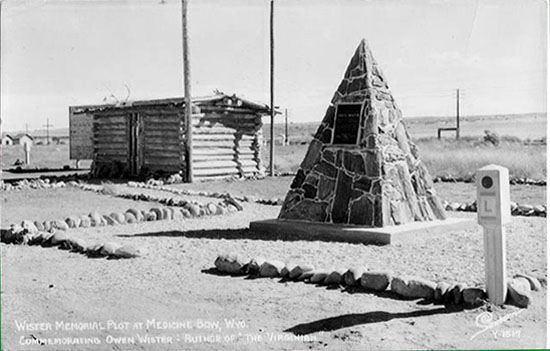
Wister Monument, Medicine Bow
Early motorists on the Lincoln Highway did not
see the monument. It was not constructed until 1939. The monument was built of petrified wood from about
40 miles to the north. To the left of the monument is the small cabin in which Wister stayed when he was in
Jackson Hole. To the right of the monument is a Lincoln Highway marker.
By 1876, the first school was established. With
the cattle boom of the late 1870's and early 1880's, Medicine Bow became the
largest cattle shipping point on the UPRR, shipping an average of 2,000 head
a day. Additionally, it was a major outfitting center for bulltrains carrying supplies to Fort Fetterman and
points north. Prospectors hunting mineral wealth to the south also came into town for supplies. Thus, not withstanding the
lack of population, the Trabing Brothers operated a
store, saloon, restaurant, livery stable, stock ranch and freighting outfit. It also developed a certain degree of roughness.
On one occasion, some of the teamsters were having a little "fun" with Trabing's stable keeper, an individual known as
"Temperance John" and the Chief cook known as "Shu-Fly John." Both Termperance John and Shu-Flyu were drunk. Temperance
John had gotten his name by his proclivity of delivering temperance lectures while he himself
was drunk. Temperance John had been knocked off a barrel upon which he had been standing and injured. The teamsters
attempted to put both in a box large enough for only one before the party was broken up. Trabing's saloon was smashed up
several times.
On another occasion, a saloon was freshly redone with a brand new back bar with mirror and a $500.00 billiard table, the first billiard
table in the Territory outside Cheyenne and Laramie City. It didn't take long
for the boys to decide to have a "stag dance," The table was dismantled, but not in the manner
intended by Brunswick-Balke. The pieces were distributed on the prairie. The pool table was ruined. By morning, after a few
stray bullets hit barrels of whiskey and the lights, the place was wrecked. The wagon boss made good the damages.
As phrased by William Francis Hooker
So the bill was paid, the wagons were loaded, and the outfit sallied forth across the plains, the bridgeless rivers, and the
mountain passes to Fetterman where there was a pay-day. Deductions pro-rata were made from every man's
wage to even up the score with Fritz, and every bullwhacker paid his share willingly, saying it was cheap
sport for the price.The Prairie Schooner p. 50-51.
Indeed, the town was noted for its saloons. One early writer noted:
Sunday night in Medicine Bow is a time of abandonment to all social delights.
There is only one street in the "town," but wide open to this thoroughfare are the Happy
Home saloon and others as skillfully named. Every sheep and cattle ranch for a vast circle
around is hilariously represented. Tongues and pens have sung the "toughness" of this
handful of saloons; no novel of Western life is complete without a chapter devoted to
Medicine Bow; it has even been touched up for theatrical purposes.
But, the writer continued, Medicine Bow seemed to be "the forlornest place he had ever been in.
In front of a wooden building which had a false front to represent a second story,
a cowboy sprawled on his horse talking to a girl in a red shirtwaist who
leaned to him from a window under a sign bearing the legend:
'Hot lunch and bakery. Meals by the day or week.'"
While the town has quieted down, there remains three bars, the bar in the Virginian Hotel, the
"Old West" Bar, and the "Dip," now located at 202 Lincoln Highway. The Dip was originally located in a non-descript
false-fronted building and was known as the "Old Diplodocus Tavern." It took its name from the
dinosaur bones found at Como Bluffs to the east.
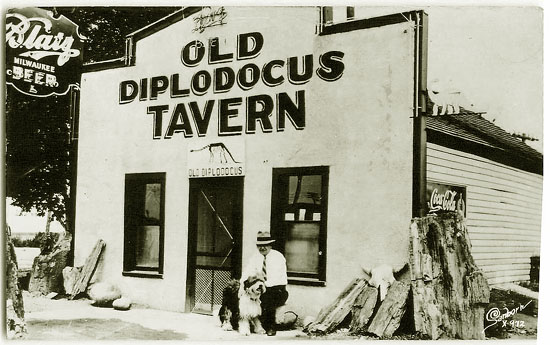
The Old Diplodocus Tavern, undated.
The Old Dip was noted for the fights that would breakout within amongst the happy customers at
rodeo time. Of course, the rodeo has not been held in years and the old Rodeo Grounds west of town sit
folorn. In 2008 there was brief discussion of reviving the rodeo for the 100th aniversary of the
town. In 2010, the issue of swapping the Rodeo Grounds for other lands cam up before the Town Council. Nobody
could actually remember when the last rodeo was conducted. In 2011, the Town voted to swap the Rodeo
Grounds for other lands. Nevertheless, a Sterling, Colorado, stock producer, puts on the
"Medicine Bow Dummy Bucking."
And just as the old Rodeo has disappeared, the Old Dip has been replaced by a modern Dip with a
large sign on the front top part of the roof proclaiming "Dip Bar." The most interesting
architectural features of the new Dip are a drive-through window,a 4 1/2 tun jade bar, and another sign in the
parking lot on a structure that looks like a windmill that tells us that the facility is
the Diplodocous Drive-In Liquors. Next door is the Little
Dip Diner.
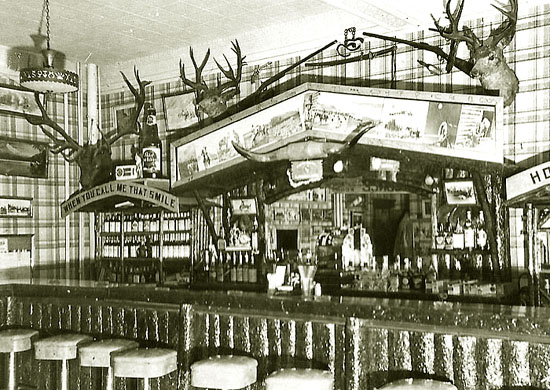
The Virginian Bar, undated.
Medicine Bow continued on next page.
|